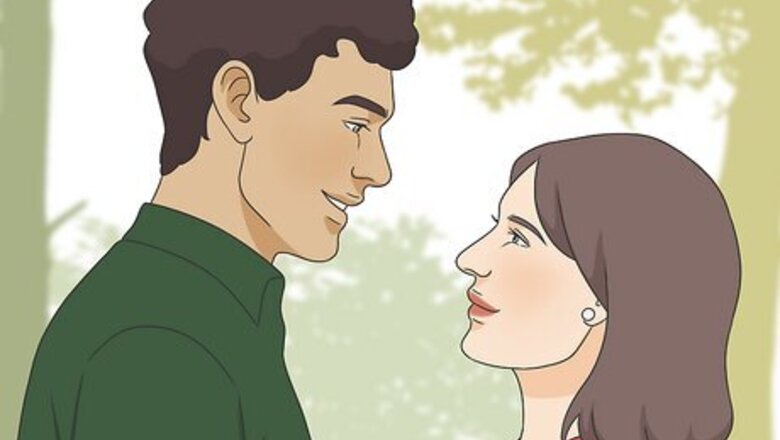
views
- Romantic attraction is an emotional urge to connect with someone and ultimately fall in love with them.
- When you're romantically attracted to someone, you see them as your ideal partner. They excite you and energize you and you can't stop thinking about them.
- You're most likely to become romantically attracted to someone if the two of you have a lot in common and they have personality traits you prefer in a partner.
Defining Romantic Attraction
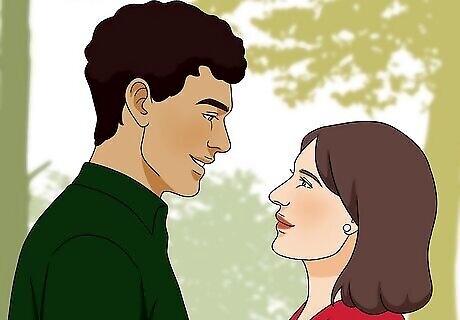
Romantic attraction is the desire to connect through emotional intimacy. It can help to think of romantic attraction as an emotional urge, while sexual attraction is a physical urge. When you're romantically attracted to someone, you want to form a strong, perhaps even lifelong, emotional connection with them. Essentially, you want to fall in love with them. Some research indicates that your romantic and sexual drives follow similar neural pathways in the brain, and this may be why romantic and sexual attraction are often experienced together. But for some people, these two drives are completely different. Other research shows that people might need to experience both sexual and platonic (friendship) attraction to someone before they can experience romantic attraction to them. Romantic attraction is usually at its peak intensity during the initial stages of a relationship and tends to transform into companionate love as the couple's relationship strengthens over time.
Signs of Romantic Attraction

You see the person as uniquely special. This is where the notion of "the one" comes from. When you're romantically attracted to someone or falling in love with them, you tend to see them as perfectly suited to you. They're your ideal person and no one else could ever come close. The fact that you're attracted to the person in many different ways often contributes to your romantic attraction. For example, you might be more likely to be romantically attracted to someone who you're also intellectually and physically attracted to. People also talk about connecting on different levels or having a lot of things in common. The more things you and your beloved have in common, the more it seems like they must have been made just for you.

You can't stop thinking about the person. When you're romantically attracted to someone, suddenly everything reminds you of them. It seems like no matter where you are or what you're doing, they somehow enter your mind. You likely feel as though you couldn't stop thinking about them if you wanted to (not that you want to!) This intrusive thinking can also lead you to over-analyze every word or action from your beloved. The more insecure you feel about how they feel about you (think having a crush on someone who barely knows you) the more likely you'll be to pick apart everything they say and do. Some studies have shown that romantic love and obsessive-compulsive disorder have similar effects on the levels of serotonin in your brain. Researchers speculate that this could account for much of the intrusive thoughts and obsessive thinking associated with romantic love.
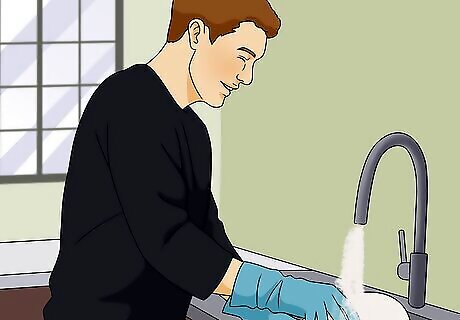
You feel energized, alert, and excited. One of the most incredible things about romantic attraction is the level of energy you get as a result. You may find things easy—even fun!—that were previously a drag. If you find that you're singing to yourself as you wash the dishes with a big goofy smile on your face, you might just be experiencing romantic attraction. People in this state are often hyper-alert as well, so you might find that you notice details you never paid attention to before. Don't be surprised, also, if the world suddenly looks brighter and more beautiful.
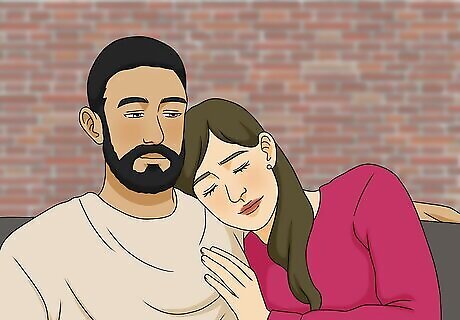
You focus on the person's positive qualities and ignore any negatives. The common phrase "love is blind" refers to this particular sign of romantic attraction. While you're in the throes of it, the person you're romantically attracted to can do no wrong. You readily brush off anything potentially problematic. If you do happen to notice something that might be cause for concern, you're far more likely to rationalize it or write it off as a one-time incident. If friends or family are critical of your beloved, you'll likely defend them vigorously and point out all the wonderful things that you love about them.
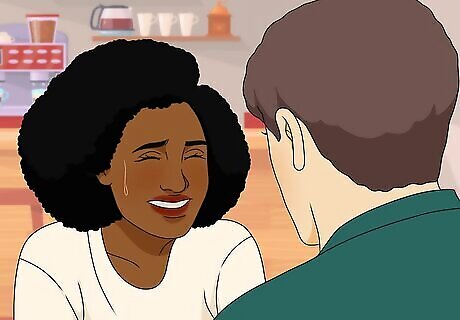
You feel nervous or excited when you're around the person. This is what people refer to as "butterflies in your stomach." You feel buzzy and floaty when you're around them, a feeling that likely only intensifies if they touch you or if your eyes lock. You might find that your palms are sweaty when you're around the person (which makes holding hands difficult), or that you feel as though your heart is beating out of your chest. These symptoms are very similar to what you might feel when you're anxious or panicked, and they can actually be very uncomfortable or embarrassing for some people.
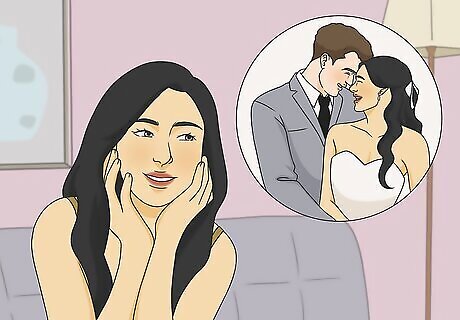
You see the person as a part of your life in the distant future. Romantic attraction is characterized by a feeling of and desire for commitment. You'll likely find yourself thinking long-term and seeing yourself being happy with your beloved. You might even be thinking about the prospects of getting married or starting a family—even if you know deep down that it's far too early to start mentioning these things. At the early stages of romantic attraction, this is more about dreaming of a somewhat idealized future than it is about making concrete plans.
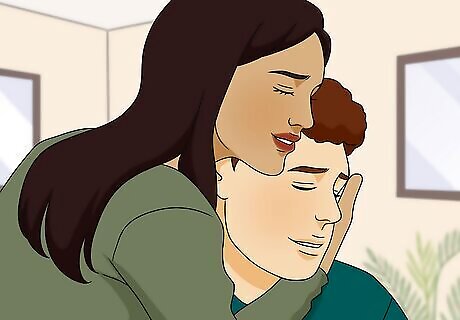
You feel strongly empathetic towards the person. Romantic attraction is strongly connected to feelings of attachment. When you feel romantically attracted to someone, there's also a part of you that wants to take care of them and protect them. When they hurt, you hurt—and you want to make things better for them. Feeling such strong empathy for someone is also associated with a willingness to sacrifice for them. You might feel the urge to put their needs ahead of yours.

You're willing to change your life for the person. When you're romantically attracted to someone, they become your priority and you would do anything to ensure that you can stay close to them and continue being a part of their life. There's a scientific reason for this! Your brain loves the chemicals produced when you're falling in love and pushes you to do things that will enable you to get more of those chemicals. This functions similarly to addiction—your brain produces chemicals that reward you when you spend time with your person. This motivates you to do whatever it takes to ensure that you can spend as much time as possible with them. Because the relationship has become your #1 priority, other things might fall by the wayside. For example, you might decide to move to another city so you can be closer to your beloved, even though this means uprooting your family or finding a new job. This sense of priority-shifting is also related to an increasing tendency to take greater risks when you're in this state of romantic attraction. Things you ordinarily would think were too risky become perfectly rational if they'll enable you to spend more time with the person you love.
What causes romantic attraction?
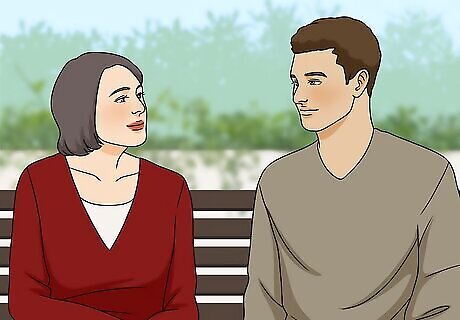
People are most attracted to others who are similar to them. There are actually a number of different factors that play into whether you'll be romantically attracted to someone or not, but similarity is the strongest predictor. This is an overarching similarity that includes not just physical and personality traits, but also your values and your perspectives on life and the world. Here are some other factors that might lead to romantic attraction: Familiarity: The more time you see someone, spend time with them, and think about them, the more likely you are to experience romantic attraction towards them. Personality traits: The more personality traits someone has that you like or find desirable, the more likely you'll be to become romantically attracted to them. Reciprocal liking: If you know that the other person likes you or is attracted to them more, that increases the probability that you'll like them back. Social approval: If your friends, family, and general social network accept or embrace you being with someone, you're more likely to experience romantic attraction to them. Other types of attraction: You're more likely to feel romantically attracted to someone who you're also attracted to in other ways (for example, sexually attracted or intellectually attracted). The more ways you're attracted to them, the stronger your romantic attraction will likely be.
Other Types of Attraction

Romantic attraction can occur alongside other types of attraction. Romantic attraction definitely isn't the only way that you can be attracted to a person—and typically, if you're romantically attracted to someone, you're attracted to them in other ways as well. This is part of what makes it so difficult for people to identify exactly what romantic attraction is and distinguish it from other types. Here are some common types of attraction you might experience: Sexual attraction: You are attracted to someone sexually or wish to engage in sexually intimate activities with them (which may or may not actually include penetrative sex). Platonic attraction: You want to become friends with someone and connect with them in a meaningful way, but you don't envision falling in love with them or wanting to have sex with them. Aesthetic attraction: You're attracted to the way someone looks and their general vibe. This often includes not only their physical features or body shape but also their style and the way they carry themselves. Sensual attraction: You want to be physically intimate with someone in a non-sexual way, such as by cuddling, hugging, or holding hands. Emotional attraction: You want to get to know someone and connect with them on a deeper level, typically because of their personality rather than how they look. Intellectual attraction: You're attracted to the way someone thinks, to their ideas, or to the way their mind works.
What is romantic orientation?
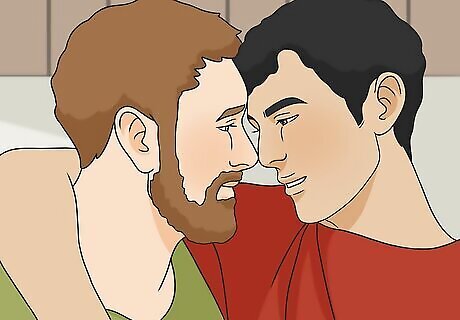
Romantic orientation reflects your pattern of romantic attraction. Like sexual orientation, your romantic orientation is a way for you to tell others the types of people that you are typically romantically attracted to. There's a corresponding romantic orientation for every sexual orientation you can think of—and they don't always match up (although they often do). For example, you might be pansexual, meaning that you're sexually attracted to all people regardless of their gender identity, but heteroromantic, meaning that you're only romantically attracted to (you only fall in love with) people of the opposite sex. Romantic orientation exists on a spectrum and can also change over the course of your life or depending on the context of your relationship with a particular person. For example, a woman might fall in love with another woman even though she considers herself heteroromantic. Many people don't give much thought to their romantic orientation because it lines up with their sexual orientation. People are much more likely to label their romantic orientation if it differs from their sexual orientation.




















Comments
0 comment